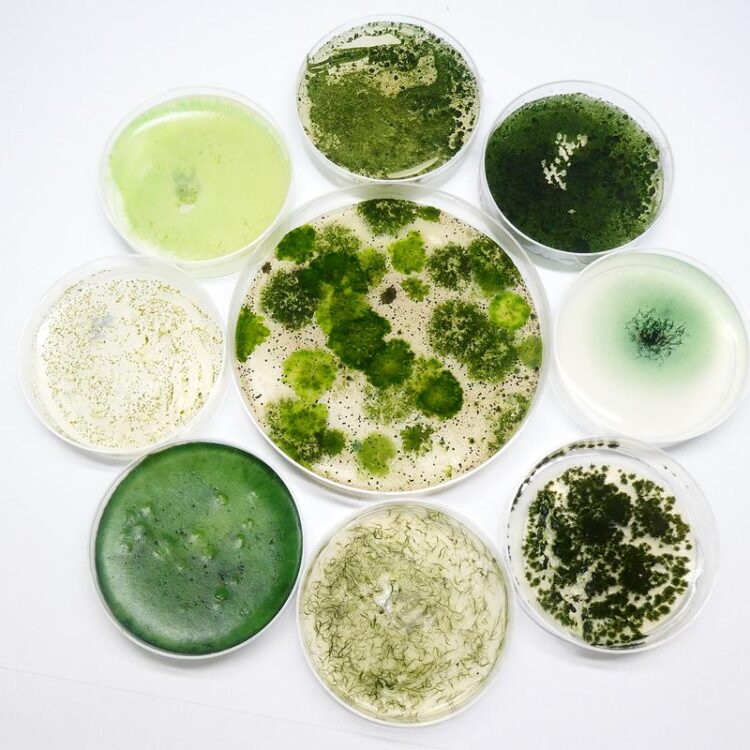Cyanobacteria: Small Candidates …

The team headed by Dr Paul D’Agostino will sequence 40 symbiotic and rare terrestrial cyanobacteria for the production of new active agents and to explore the potential for applications in biotechnology.
(c) Paul D'Agostino
… as Great Hopes for Medicine and Biotechnology
In the coming years, scientists at the Chair of Technical Biochemistry at TU Dresden will work on the genomic investigation of previously unexplored cyanobacteria. Cyanobacteria are among the oldest forms of life and are of great ecological importance. In order to unlock the genetic potential of unusual cyanobacteria for the production of new active agents and to explore the potential for applications in biotechnology, the team headed by Dr Paul D’Agostino has been awarded a competitive whole-genome sequencing grant from the Joint Genome Institute (JGI) in the USA.
An ever-growing global population, an increasing standard of living and environmental challenges such as anthropogenic climate change, ocean pollution, the declining availability of arable land and dwindling fossil resources – these are today’s global challenges. Therefore, the German Federal Ministry of Education and Research has dedicated the Science Year 2020/21 to the topic Bioeconomy with the aim of meeting these challenges with little heroes. The “stars” of bioeconomy are proteins, algae, microorganisms, and other tiny creatures with great impact.
At the Chair of Technical Biochemistry at TU Dresden, the researchers will now focus on some of the oldest of such little superheroes: cyanobacteria. There are about 2000 species of cyanobacteria and many of these species have been poorly researched. Dr Paul D’Agostino, Professor Tobias Gulder and their team – including cooperation partners Michelle Gehringer (TU Kaiserslautern), Michael Lakatos and Patrick Jung (both Hochschule Kaiserslautern) – hope that unusual cyanobacteria will yield promising results and make an innovative contribution to bioeconomy.
“Microorganisms produce valuable organic molecules with great potential for many applications. It is important to know that unusual organisms often also produce novel bioactive agents. The discovery of such new, bioactive molecules is essential if one thinks, for example, of new medical challenges such as the coronavirus and the progressive development of resistance to established active agents. Within the scope of this project, we therefore want to investigate the genetic potential of very unusual cyanobacteria for the production of innovative active pharmaceutical ingredients,” explains Gulder.
As a first step, the team will predict the potential of natural compounds by sequencing the genomes and subsequent bioinformatic analysis. The results can then be translated into the targeted discovery of new molecules using modern methods of synthetic biology and biotechnology. As a final step, the project will focus on the production and characterization of these natural compounds and on the application of the enzymes producing these compounds as biocatalysts for the development of sustainable chemical processes.
Wissenschaftliche Ansprechpartner:
Dr Paul D’Agostino
Chair of Technical Biochemistry
TU Dresden
Email: paul.dagostino@tu-dresden.de
Prof Dr Tobias Gulder
Tel.: +49 351 463-34494
Email: tobias.gulder@tu-dresden.de
Media Contact
All latest news from the category: Life Sciences and Chemistry
Articles and reports from the Life Sciences and chemistry area deal with applied and basic research into modern biology, chemistry and human medicine.
Valuable information can be found on a range of life sciences fields including bacteriology, biochemistry, bionics, bioinformatics, biophysics, biotechnology, genetics, geobotany, human biology, marine biology, microbiology, molecular biology, cellular biology, zoology, bioinorganic chemistry, microchemistry and environmental chemistry.
Newest articles

Sea slugs inspire highly stretchable biomedical sensor
USC Viterbi School of Engineering researcher Hangbo Zhao presents findings on highly stretchable and customizable microneedles for application in fields including neuroscience, tissue engineering, and wearable bioelectronics. The revolution in…

Twisting and binding matter waves with photons in a cavity
Precisely measuring the energy states of individual atoms has been a historical challenge for physicists due to atomic recoil. When an atom interacts with a photon, the atom “recoils” in…

Nanotubes, nanoparticles, and antibodies detect tiny amounts of fentanyl
New sensor is six orders of magnitude more sensitive than the next best thing. A research team at Pitt led by Alexander Star, a chemistry professor in the Kenneth P. Dietrich…





















